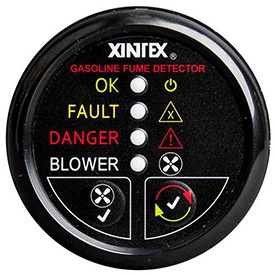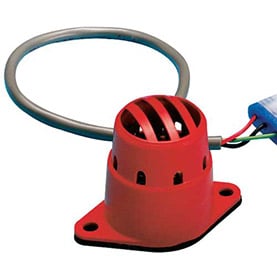Why You Need a Vapor Detector

The Xintex M-Series fuel vapor detector monitors gasoline fumes and automatically activates the bilge blower when fumes become dangerous.

Order an extra sensor to monitor a second location on your vessel.
Fume detectors monitor the concentration of dangerous gasses in the air and sound an alarm to warn of a potentially dangerous situation. They help prevent explosions or fires from concentrations of gasoline vapor or propane gas. Fuel vapor detectors will react to some—but not all—combustible vapors like cooking fuels, hydrogen, solvents, and certain cleaning compounds.
How Vapor Detectors Work
A special sensor wire has a small electrical current passing through it when the unit is turned on. The presence of combustible hydrocarbon vapors causes a change in the wire’s resistance, triggering the alarm. Fuel vapor sensors sound the alarm if the concentration of explosive gasses in the air reaches 10 to 20 percent of the lower explosive limit (LEL) which is the minimum concentration of vapor that can combust if there is a spark or other ignition source. Having a warning when vapor concentration is still low gives you time to fix the problem and save your boat and crew.
Gasoline and Diesel Fumes
A common misconception is that a bilge blower will eliminate dangerous vapors prior to starting a gasoline engine. Running a blower doesn't always eliminate the risk of combustion because fuel leaks can create fumes as quickly as the fan can remove them. For peace of mind, we offer fuel fume detectors with automatic bilge blower activation, which keep your boat safe while it is unattended and will sound an alarm if the blower can’t keep up with the fumes.
Propane and Compressed Natural Gas
Propane is by far the most popular onboard heating and cooking fuel because it is efficient, cheap and readily available wherever you go. Propane is heavier than air and settles below deck in enclosed spaces like storage lockers and the bilge where an electrical spark can ignite it. These are also areas where you are not likely to smell propane accumulating making a detector essential to keep your boat safe. If you use compressed natural gas (CNG) on your boat you will need a separate CNG detector. CNG is lighter than air and rises to the top of enclosed spaces and CNG detectors must be mounted within 9" from the ceiling to account for this.
Features to Look for in a Vapor Detector
Automatic bilge blower activation: Many fuel fume detectors will set off an alarm and start the bilge blower to extract harmful fumes and reduce the danger of explosion. This is especially useful when no one is on board the vessel.
Audible and visible alarms: Look for gasoline vapor and propane detectors with both audible and visual alarms. Test your alarm often to esnure that it is working. A detector that properly detects fumes but doesn’t trigger an alarm is useless.
Sensitivity: You don’t want an alarm to go off a second before the concentration of harmful gasses reaches explosive levels, which is why gasoline, propane and CNG detectors set off the alarm at 10 to 20 percent of the LEL. This extra warning gives you time to fix whatever the problem is before vapors reach dangerous levels.
Sensor mounting position: Propane sensors should be mounted low and near the appliance using propane such as a stove or heater. Gasoline sensors mount just above slosh height in the bilge but no lower than the height of the starter solenoid in the bilge. CNG is lighter than air and rises to the top of an enclosed space so CNG sensors must be mounted within 9" of the ceiling to work properly. Keep in mind that vapor sensors are not waterproof and should not be mounted in areas where they will be submerged in water.
Battery vs. hardwired: Detectors without power are useless We recommend hardwired units that are always on and don’t need battery replacements. Choose a detector that includes a power indication light so you know that the detector is on and functioning properly.